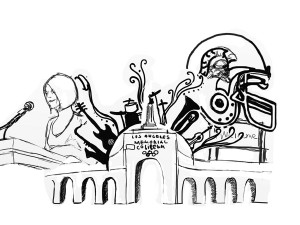Coliseum necessitates new roles
The Coliseum serves not only as the home of Trojan football, but also as a historical symbol of USC and South Los Angeles.
The Coliseum, however, has been standing on shaky ground recently. With the venue on the verge of bankruptcy and Coliseum executives facing charges for corrupt management, the city, county and state have proven unable to sustain the taxpayer-owned stadium as a functional and profitable enterprise.
The university has amended its pre-existing lease with the Coliseum Commission to assume management control of the Coliseum, turning it into an essentially private enterprise.
On the outside, it appears that the pending deal will only benefit the Coliseum, with the university planning to pour $70 million in renovations toward the complex, according to the Los Angeles Times.
The aging Coliseum will undoubtedly be revamped to live up to the dominance of Trojan football, giving fans more than enough to cheer for.
If the deal passes and USC becomes the new manager of the Coliseum, however, the school has certain obligations — obligations that its predecessors were unable to fulfill.
One of the university’s most crucial responsibilities is to increase transparency as it undergoes lease alterations and finalizations with the commission. It’s a smart move, as USC cannot follow in the commission’s scandal-plagued footsteps.
According to the Los Angeles Times, a first amendment group called The Californians Aware and the Times are suing the commission for denying public discussions and records over the new lease, struck by the university and the commission behind closed doors, as a violation of the Ralph M. Brown Act.
Public accountability is ultimately the government’s burden, but the university also has a responsibility to ensure community involvement as the new manager of what has been and should continue to be a community stadium as a state and local landmark.
Though greater transparency is only the first step, the university must also prove its commitment to the city by continuing to support public events at the Coliseum. The proposed lease entails that USC must reserve a minimum of eight days a year for public events planned by the commission; thus, the community could very well be cut out of using the stadium as a gathering place for much of the year.
As a university that “draws its unique vigor from [its] surrounding communities,” as stated on its website, USC owes the community and the student body a strong devotion to public development and service. Only then will the Coliseum be restored to its former glory as a historic venue that proudly stands not only for the Trojan Family, but also for a united Los Angeles community.
Daffany Chan is a freshman majoring in print and digital journalism.

